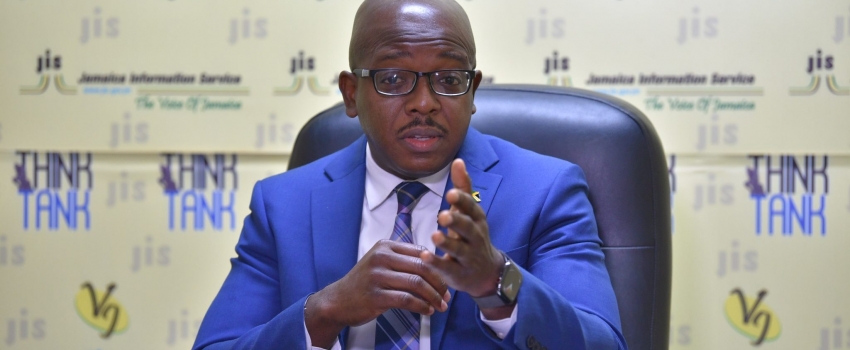You are here
Home | KNOWLEDGE OF MARINE ASSETS KEY TO SUSTAINABLE EXPLOITATION OF BLUE ECONOMY

Minister of Agriculture and Fisheries, Hon. Pearnel Charles Jr., addresses a recent JIS Think Tank.
AF/3025/22
KINGSTON, February 21 (JIS):
Agriculture and Fisheries Minister, Hon. Pearnel Charles Jr, says that knowledge of the assets within Jamaica’s marine space is key in enabling the country to sustainably tap into the blue economy while protecting the marine ecosystem.
“We have a massive marine space, which is primarily untapped and needs to be protected. It all comes down to really defining first what is there, identifying the best way to exploit it, and putting in place systems and policies that [safeguard] what we need to keep in a protected zone,” he noted.
Minister Charles Jr said that having such information will also facilitate mechanisms “to build the capacity of the fisherfolk and provide them with the resources and support, to know exactly how to exploit [the resources] without destroying what we have”.
Noting, for example, the importance of mangroves in providing breeding grounds for fish, he said that those who “make their living, feed their families and send their children to school off of fishing” should be the primary advocates of mangrove protection, similar to environmentalists.
The World Bank defines the blue economy as the sustainable use of ocean resources for economic growth, improved livelihoods and jobs, while preserving the health of the marine and coastal ecosystem.
It includes activities such as fisheries, coastal tourism, maritime transport, port activities, shipbuilding and repair, marine extraction of oil, among others.
Last year, the Government made a request for proposals to conduct a blue economy assessment for the country. The evaluation, which will provide a baseline for the effective development and use of the marine space, will be funded by the World Bank.
On the international scene, having adequate knowledge of the blue economy has led to new techniques in fisheries management, such as the use of satellite data for environmental monitoring, unmanned surface vessels to track pelagic fish, artificial intelligence in aquaculture to automate effective feeding and reduce disease, and mobile phone apps to provide early warnings to fisherfolk of optimal and dangerous fishing conditions.
“Once we finish the mapping and do the assessments of the marine space, making those connections and the linkages between our operations, our practices and protecting and positively exploiting [the marine resources] are going to be critical going forward,” Minister Charles Jr. said.
-30-
CONTACT: CHARNELE HENRY
|
|
|
Hope Gardens, Kingston 6, Jamaica
Opening hours:
Mondays - Thursdays 8:30 a.m. - 5:00 p.m.
Fridays 8:30 a.m. - 4:00 p.m.
MoAFM Customer Feedback System: https://www.moa.gov.jm/customer-feedback
|